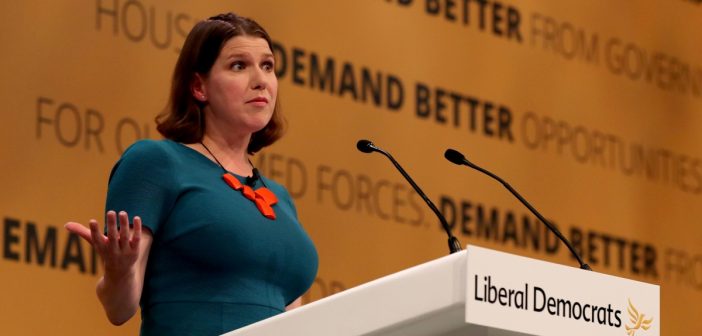The election of Boris Johnson as Tory leader, the outcome of the European elections and the result of Brecon and Radnorshire by-election, won by the Liberal Democrats with Labour in fourth place, have combined to further deepen alarm among Jeremy Corbyn supporters.
In the Welsh by-election the Greens and Plaid Cymru stood down to maximise the chances of a Liberal victory against the Tories, a successful move.
It is increasingly obvious that with a parliamentary majority of just one, the Conservatives will now go for a general election. Whether this comes before, or just after, a Tory Brexit, it will certainly be the ‘Brexit election’. Labour activists fear being caught in a pincer movement between the Liberal Democrats on an anti-Brexit platform, and the Conservatives’ hard Brexit position (with help from the Brexit party in squeezing the Labour vote).
This background has led to calls for an electoral alliance with the Greens and the Liberal Democrats, and in Wales with Plaid Cymru. Paul Mason, writing in the Guardian, calls for a full-blown popular front, on the model of the French popular front which took power in 1936.
Mason puts his finger on the dangers of a Johnson government:
“For progressives, the last two weeks have shown how high the cost of losing that general election would be. The country would be ruled by a faction of elite Tories who have abandoned their moral and intellectual dividing lines with the far right. Britain would become an appendage of the United States, in foreign policy and in trade. It would be goodbye to the welfare state and the tolerant society.”
Mason is right about one other thing. To guard against defections to the Liberal Democrats, Corbyn has to become the leader of the fight against a hard Brexit, effectively any Brexit at all likely to be agreed by a Johnson cabinet. Labour must stop equivocating. How can Labour effectively fight the hard-right Tory Brexiteers if it does not champion what to millions seems the obvious and logical alternative – revoking Article 50 and staying in the European Union.
But a formal alliance with the Liberal Democrats would be a calamity. Such an alliance, a new popular front, would have to be an alliance for government and have a programme. And the problem with that is that the Liberal Democrats are not an anti-austerity, anti-privatisation party and would veto radical economic and social measures. Any substantial increase in the number of Lib Dem MPs would create a secondary anti-Corbyn anti-radical bloc in parliament.
The last Liberal Democrat election manifesto supports calls for ‘a fairer Britain’ and ‘investment in public services and infrastructure’, just like every other party. It does not support the introduction of a real living wage as the minimum, nor a big investment programme in the NHS and social care, a big campaign of social housing building, or the abolition of zero hours contras acts. Nor does it support the abolition of the draconian anti-union laws, which underpin the maintenance of neoliberalism in Britain.
New Lib Dem leader Jo Swinson was a junior minister in the Tory-Liberal coalition government and voted along the line for numerous disastrous austerity measures. As Anoosh Chakelian records:
“Swinson voted with the 2010-15 Tory-led government to back some of the most disastrous, harmful and utterly gratuitous cuts to public spending. Her voting record is stark. The bedroom tax, the Education Maintenance Allowance cut, the public sector pay cap, disability benefit cuts, general welfare cuts, cuts to local authority funding — it’s all there. In terms of her voting record, Swinson is no different on paper from the Conservative ministers of the time.”
Of course, parliamentary votes on austerity are not just an indiscretion ‘on paper’. They involve very serious matters of life and death, affluence and poverty, misery and hope. Not the sort of thing that should stand in the way of the career of a Liberal Democrat minister.
Swinson has in the past refused to rule out a coalition with the Tories, but now says she couldn’t support a coalition with a Johnson-led Conservative Party. Well, that’s what she says. After an election she might easily change her mind. In any case, the one thing she definitely rules out is an alliance with a Corbyn-led Labour Party. Swinson wants the Lib Dems to have their own share of the mud-slinging against Labour and Corbyn over fake anti-Semitism charges. In effect she is saying the price of an alliance would be a right-wing Labour takeover, which is not going to happen before a general election.
The way forward to fight off the Liberal Democrat challenge is not an alliance with them, but for Labour to take leadership of the anti-Brexit forces. Labour will certainly lose some hard-Brexit voters, but the damage is mainly done on this front and they are probably not going to be won back any time soon.
As Owen Jones points out:
“For those of who [sic]proposed a soft Brexit, it was always damage limitation. Dealing with the electoral dilemma of Brexit is one thing — and it’s a legitimate argument to fear that Labour will alienate some communities it needs to win to form a government if it adopts a full Remain position. I think this position has collapsed — the middle ground on Brexit has collapsed, Labour is losing far more Remainers than Leavers, most Leave voters now think that ‘No Deal’ is the only genuine Brexit and believe a soft Brexit is ‘Brexit In Name Only’.”
The way out of the current Labour impasse is to stand up to and repudiate the fake anti-Semitism charges; and to take the leadership of anti-Brexit political sentiment. Calls for a popular front are beside the point.

